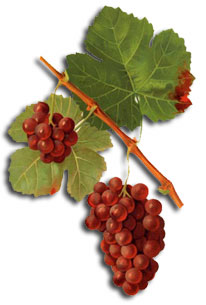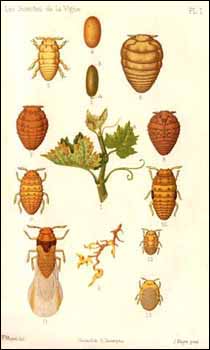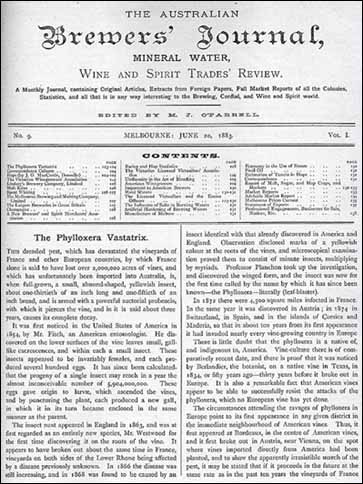
Wine Literature of the World

Phylloxera
Australian brewers' journal vol.1. no 9, June 20, 1883. "The Phylloxera vastrix". The destruction of the affected vines did not solve the problem of the disease. This is an early call for "the necessity of not planting vines in the diseased districts for years to come". Australian vigneron and fruit-growers journal vol. 1 no.1 May 1, 1890, "Phylloxera". NSW growers are accused of not taking the disease seriously. Australian vigneron and fruit-growers journal vol. 1 no.4 August 1, 1890. "The Geelong district". Victorian views on the replanting of vines in destroyed areas including those of Hubert de Castella, "one of the most experienced vignerons in Australia", given before the Royal Commission on Vegetable Products in 1886.
|
|
Copyright and this website | Disclaimer | Privacy | Feedback | Accessibility | FOI |

 The
arrival of Phylloxera vastatrix, a vine grape louse which attacks
the roots of the vine, had a disastrous effect on the vineyards
of New South Wales and particularly Victoria. It was discovered
in Australia in 1875 in the Geelong area and soon spread throughout
the region. The Victorian Government ordered the destruction
of vines and the sterilization of the soils, but the disease
still spread to other areas. Athough some vineyards escaped,
phylloxera managed to vitually wipe out whole wine-growing
areas such as Geelong and Bendigo, and to devastate the major
Rutherglen region. South Australia managed to escape the disease.
All states are aware that the disease could reappear at any
time.
The
arrival of Phylloxera vastatrix, a vine grape louse which attacks
the roots of the vine, had a disastrous effect on the vineyards
of New South Wales and particularly Victoria. It was discovered
in Australia in 1875 in the Geelong area and soon spread throughout
the region. The Victorian Government ordered the destruction
of vines and the sterilization of the soils, but the disease
still spread to other areas. Athough some vineyards escaped,
phylloxera managed to vitually wipe out whole wine-growing
areas such as Geelong and Bendigo, and to devastate the major
Rutherglen region. South Australia managed to escape the disease.
All states are aware that the disease could reappear at any
time. 